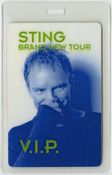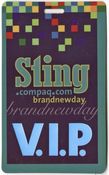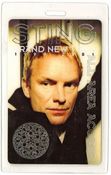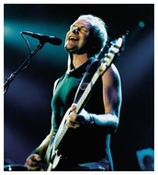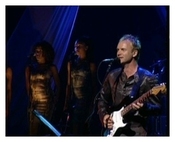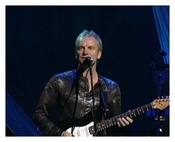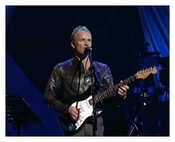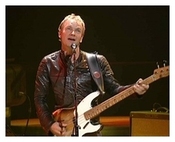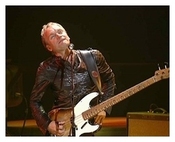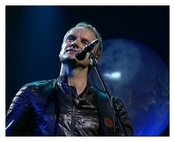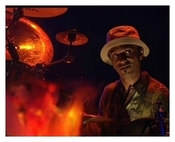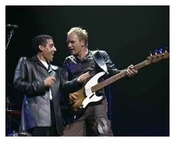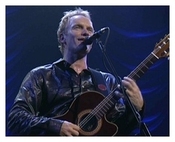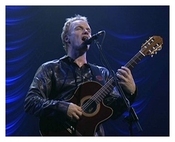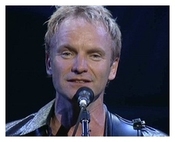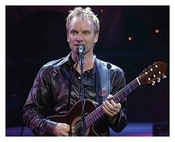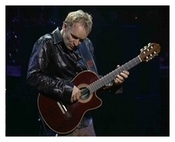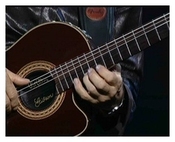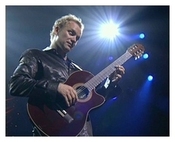
Brand New Day
Dec
3
1999
Chicago, IL, US
Chicago Theatrewith Me'Shell NdegeOcello
Sting's energetic show surprises his audience...
A lot of people are pretty cynical about Sting these days, and with good reason.
After all, he's gone from 'Quadrophenia', punk to MTV rocker and VH1 fave and become an adult contemporary staple.
Nowadays, the 48-year-old Sting has mellowed a bit, but he still looks the part, with his intense eyes, impish grin and trademark blond hair (although there's a little less of it than before).
The sceptics would be in short supply after Friday night's energetic, sold-out show at the Chicago Theatre.
Looking young and spry for a 48-year-old, the black leather-jacketed Sting (nee Gordon Sumner) began with a haunting 'A Thousand Years', from his latest album, 'Brand New Day'.
He followed with a funk rendition of 'If You Love Somebody Set Them Free', punctuated by Chris Botti's terse trumpet trills.
The usually uptight Sting got playful on 'We'll Be Together', doing a rubber-legged dance and trading riffs with guitarist Dominic Miller.
Sting even engaged in some banter, joking that audience members were saying, ''He was better with The Police.''
He waited until 45 minutes into the show to do his first ''Police'' song, 'Every Little Thing She Does Is Magic', but the ebullient singalong was well worth the wait.
The limber singer donned a low, lidded hat and his best Tom Waits croak on 'A Moon Over Bourbon Street', which segued smoothly into a jazz-inflected 'Englishman In New York'.
Vigorous audience clapping and Botti's deft trumpet even injected some life into his latest album's tepid title tune.
The concert reached a dizzying zenith when opener Me'Shell Ndegeocello joined the band for 'Roxanne', and her walking bass lines gave the classic tune a sharp new energy.
The show got even better with the goose-bump producing world-music chanting of 'Desert Rose'.
Unbelievably, Sting even took a back seat to his top notch band at one point, ceding the spotlight to nimble-fingered keyboardist Jason Rebello and octopus armed drummer Manu Katche on The Police tune 'When the World Is Running Down You Make The Best Of What's Still Around'.
By the time he played a joyous 'Every Breath You Take', even the most hard-core cynic would be hard pressed to be mad at Sting anymore for leaving The Police.
Opener Ndegeocello overcame an absurdly muddy sound system to provide a strong warm-up with her jazzy, folky, funky songs.
(c) The Chicago Daily Herald by Joel Reese
Sting's oldies outclassed by new material...
Sting's got guts.
The former Police mastermind, now 48, became a pop legend nearly two decades ago by penning masterpieces such as 'Message in a Bottle' and 'Don't Stand So Close to Me'. Handsome, charming and blessed with one of rock's few instantly identifiable voices, he could have sung Every Breath You Take in every Vegas hotel until his bankbook couldn't hold any more zeros.
Instead, the guy up and decides to experiment with jazz and layers and inside-out melodies that downright confound any fan who ever clenched a fist and harmonized with him on 'Roxanne'. His newest record, 'Brand New Day', might be his most elusive - and his best - to date.
Then he decides to come to the Chicago Theatre on Friday for the first of two sold-out gigs and play most of that new material. The audience, like past audiences, will tolerate this textured, difficult fare, and Sting will repay them with a few golden oldies.
But here's where Sting crossed them up Friday, and many at the Chicago Theatre still don't know it.
His new material, the stuff resented by many critics and secretly endured even by some Sting fans, was uniformly brilliant. In conception, execution and especially emotion of delivery, the half-dozen or so new songs Sting performed were moving beyond anything Police-based the Englishman tried.
By opening with the moody and deliberative new 'A Thousand Years', Sting sent a message that he would not be rushed or coaxed out of his new material. The song's vocals, more chanted than sung, were frosted with a backdoor sadness that finds its way into much of the best of his newer material. Even the muted tone Sting found on his guitar during this number, an electric sigh if ever there was one, introduced mood as the evening's main player.
Other new numbers were similarly moving. Even the countryish Fill Her Up wound down into the kind of melancholy reflection that Sting sneaks in so deftly. (Listen to 1996's 'I'm So Happy I Can't Stop Crying' for a Sting clinic on how to write a devastatingly painful upbeat song.) 'Fields of Gold', an older Sting number featuring just guitar, bass and restraint, was breathtaking.
The Police material, on the other hand, was consistently rushed, even manhandled. Songs such as 'When the World Is Running Down' and Every Little Thing She Does Is Magic' played as if someone's diabolical little brother had set the metronome too fast. Sting toyed here with vocal interpretations, but you'd be bored, too, if you had to play 'Roxanne' for the rest of your life. The fact that the audience clearly believed the Police material to be the evening's highlight can't be considered entirely good news for an artist who consistently embraces risk.
Sting's voice remains strong and capable of hitting those ringing high notes. More notably, he remains a bassist of the first order, a distinct non-showoff whose touch with that instrument is midwife to the melodies that trademark his most emotional pieces.
It's fashionable now to say that aging rock stars should pack in the oldies shows and disappear gracefully. Sting, to his eternal credit, continues to create. Some of the stuff isn't easy to get your arms around, but in a live, intimate setting such as the Chicago Theatre, it's worth it if you try.
(c) The Chicago Sun Times by Bob Kurson
Brand New trust fund...
It's been quite a few years since rock'n'roll began its slide down the slippery slope to corporate hell. The influx of money at first was good in that it helped artists earn a reasonable living over the course of their often brief careers. However, as is the case with all things corporate, the culture quickly has spiraled out of control as each individual succumbs to greed. This, in a nutshell, is how the rock world inevitably slid to the wrong end of the spectrum.
It was bad enough when every classic rock song imaginable was pilfered for a commercial jingle, but did we really need last week's hit single to peddle automobiles? Of course, just when you thought it couldn't possibly get much worse, the large businesses - the same ones that are undeniably running the world - set their sites on concert-goers. Not that this is new. After all, the Rolling Stones sold their souls to the corporate devil years ago, pioneering the sale of the concert stage. This time around, though, companies are back with a vengeance.
This past summer, patrons at Tinley Park, Illinois' New World Music Theatre were tortured with a barrage of commercials during the break between Wilco and R.E.M.'s sets. Although neither band profited directly from this endeavor, it was a tremendous imposition on their fans, and the headline act's claim of ignorance and innocence is hardly acceptable, given their stature and clout.
Be that as it may, Sting is the latest artist to flaunt his new-found source of wealth in the face of his fans.
At his Chicago Theatre appearance on December 3, advertisements for his primary sponsor were emblazoned everywhere - even appearing on the marquee in large letters, comparable in size to his own name. A second sponsor was prominently displayed at the merchandise booth.
This corporatization is completely unnecessary and seriously undermines the integrity of an artist. Does Sting really need the money infused by these companies? Perhaps he chose his main sponsor, a computer manufacturer, because he squandered his fortune trying to solve the instability problems inherent in the Windows operating system, and mistakenly thought it was a hardware problem. However, it's more likely he simply sold-out to the highest bidder. In any event, at least the offending advertisements were removed from the stage once the show began.
Unfortunately, Sting's performance was a largely uneven affair, featuring far too much of his overplayed, older material. Sting waltzed through tunes like 'All This Time', 'Englishman in New York', and 'Every Little Thing She Does is Magic' as if he felt obligated to perform them. As a result, many of these songs lacked the energy that they've carried on past tours and instead, sank into pale imitations of themselves. Even a guest appearance by Me'Shell Ndegeocello failed to lift 'Roxanne' out of the doldrums, and her talent as a bassist was wasted by bringing her out towards the end of the song for an impromptu jam as Sting ad-libbed a repetitive vocal.
On the other hand, there were plenty of moments that worked quite well. An uplifting 'After the Rain Has Fallen' drifted into a punchy 'We'll Be Together' as Dominic Miller laid a muscular guitar solo over Manu Katche's pulsating drum beat. On 'Fill Her Up', the group perfectly made the transition from country to gospel at the pivotal point in the song, giving it a transcendent quality that matched its story line.
In addition, Sting has been working jazz-oriented themes into his music since his days with The Police. Consequently, his touring bands have always explored these songs more fully in concert, and this evening was no different. In particular, keyboardist Jason Rebello and trumpeter Chris Botti brought these selections to life with their rousing instrumental prowess. The best of these was by far an intoxicating rendition of 'Moon Over Bourbon Street 'on which Sting delivered sang with a raspy, Louie Armstrong-inspired voice, while simultaneously performing a sultry Fever-induced melody on bass.
A few softer moments also stood out, including the gentle strains of Miller's guitar on 'Fields of Gold', Sting's haunting solo acoustic performance of 'Message in a Bottle', and the beautiful 'Fragile' that concluded the show. Yet, the disjointed nature of the set list combined with the aforementioned boredom as well as several songs - like the captivating swirl of 'Desert Rose' and the joyful optimism of 'Brand New Day' - that didn't quite realize their full potential served only to undermine any momentum that started to build throughout the concert.
Me'Shell Ndegeocello began the evening with a short, but strong set of material that effortlessly crossed the boundaries from smooth jazz-pop to brawny funk to slinky rhythm & blues. Better still, she and her talented band weren't afraid to explore the musical periphery of her songs, allowing the grooves to take root and blossom into exquisite jam sessions.
(c) The Music Box web-site by John Metzger
A lot of people are pretty cynical about Sting these days, and with good reason.
After all, he's gone from 'Quadrophenia', punk to MTV rocker and VH1 fave and become an adult contemporary staple.
Nowadays, the 48-year-old Sting has mellowed a bit, but he still looks the part, with his intense eyes, impish grin and trademark blond hair (although there's a little less of it than before).
The sceptics would be in short supply after Friday night's energetic, sold-out show at the Chicago Theatre.
Looking young and spry for a 48-year-old, the black leather-jacketed Sting (nee Gordon Sumner) began with a haunting 'A Thousand Years', from his latest album, 'Brand New Day'.
He followed with a funk rendition of 'If You Love Somebody Set Them Free', punctuated by Chris Botti's terse trumpet trills.
The usually uptight Sting got playful on 'We'll Be Together', doing a rubber-legged dance and trading riffs with guitarist Dominic Miller.
Sting even engaged in some banter, joking that audience members were saying, ''He was better with The Police.''
He waited until 45 minutes into the show to do his first ''Police'' song, 'Every Little Thing She Does Is Magic', but the ebullient singalong was well worth the wait.
The limber singer donned a low, lidded hat and his best Tom Waits croak on 'A Moon Over Bourbon Street', which segued smoothly into a jazz-inflected 'Englishman In New York'.
Vigorous audience clapping and Botti's deft trumpet even injected some life into his latest album's tepid title tune.
The concert reached a dizzying zenith when opener Me'Shell Ndegeocello joined the band for 'Roxanne', and her walking bass lines gave the classic tune a sharp new energy.
The show got even better with the goose-bump producing world-music chanting of 'Desert Rose'.
Unbelievably, Sting even took a back seat to his top notch band at one point, ceding the spotlight to nimble-fingered keyboardist Jason Rebello and octopus armed drummer Manu Katche on The Police tune 'When the World Is Running Down You Make The Best Of What's Still Around'.
By the time he played a joyous 'Every Breath You Take', even the most hard-core cynic would be hard pressed to be mad at Sting anymore for leaving The Police.
Opener Ndegeocello overcame an absurdly muddy sound system to provide a strong warm-up with her jazzy, folky, funky songs.
(c) The Chicago Daily Herald by Joel Reese
Sting's oldies outclassed by new material...
Sting's got guts.
The former Police mastermind, now 48, became a pop legend nearly two decades ago by penning masterpieces such as 'Message in a Bottle' and 'Don't Stand So Close to Me'. Handsome, charming and blessed with one of rock's few instantly identifiable voices, he could have sung Every Breath You Take in every Vegas hotel until his bankbook couldn't hold any more zeros.
Instead, the guy up and decides to experiment with jazz and layers and inside-out melodies that downright confound any fan who ever clenched a fist and harmonized with him on 'Roxanne'. His newest record, 'Brand New Day', might be his most elusive - and his best - to date.
Then he decides to come to the Chicago Theatre on Friday for the first of two sold-out gigs and play most of that new material. The audience, like past audiences, will tolerate this textured, difficult fare, and Sting will repay them with a few golden oldies.
But here's where Sting crossed them up Friday, and many at the Chicago Theatre still don't know it.
His new material, the stuff resented by many critics and secretly endured even by some Sting fans, was uniformly brilliant. In conception, execution and especially emotion of delivery, the half-dozen or so new songs Sting performed were moving beyond anything Police-based the Englishman tried.
By opening with the moody and deliberative new 'A Thousand Years', Sting sent a message that he would not be rushed or coaxed out of his new material. The song's vocals, more chanted than sung, were frosted with a backdoor sadness that finds its way into much of the best of his newer material. Even the muted tone Sting found on his guitar during this number, an electric sigh if ever there was one, introduced mood as the evening's main player.
Other new numbers were similarly moving. Even the countryish Fill Her Up wound down into the kind of melancholy reflection that Sting sneaks in so deftly. (Listen to 1996's 'I'm So Happy I Can't Stop Crying' for a Sting clinic on how to write a devastatingly painful upbeat song.) 'Fields of Gold', an older Sting number featuring just guitar, bass and restraint, was breathtaking.
The Police material, on the other hand, was consistently rushed, even manhandled. Songs such as 'When the World Is Running Down' and Every Little Thing She Does Is Magic' played as if someone's diabolical little brother had set the metronome too fast. Sting toyed here with vocal interpretations, but you'd be bored, too, if you had to play 'Roxanne' for the rest of your life. The fact that the audience clearly believed the Police material to be the evening's highlight can't be considered entirely good news for an artist who consistently embraces risk.
Sting's voice remains strong and capable of hitting those ringing high notes. More notably, he remains a bassist of the first order, a distinct non-showoff whose touch with that instrument is midwife to the melodies that trademark his most emotional pieces.
It's fashionable now to say that aging rock stars should pack in the oldies shows and disappear gracefully. Sting, to his eternal credit, continues to create. Some of the stuff isn't easy to get your arms around, but in a live, intimate setting such as the Chicago Theatre, it's worth it if you try.
(c) The Chicago Sun Times by Bob Kurson
Brand New trust fund...
It's been quite a few years since rock'n'roll began its slide down the slippery slope to corporate hell. The influx of money at first was good in that it helped artists earn a reasonable living over the course of their often brief careers. However, as is the case with all things corporate, the culture quickly has spiraled out of control as each individual succumbs to greed. This, in a nutshell, is how the rock world inevitably slid to the wrong end of the spectrum.
It was bad enough when every classic rock song imaginable was pilfered for a commercial jingle, but did we really need last week's hit single to peddle automobiles? Of course, just when you thought it couldn't possibly get much worse, the large businesses - the same ones that are undeniably running the world - set their sites on concert-goers. Not that this is new. After all, the Rolling Stones sold their souls to the corporate devil years ago, pioneering the sale of the concert stage. This time around, though, companies are back with a vengeance.
This past summer, patrons at Tinley Park, Illinois' New World Music Theatre were tortured with a barrage of commercials during the break between Wilco and R.E.M.'s sets. Although neither band profited directly from this endeavor, it was a tremendous imposition on their fans, and the headline act's claim of ignorance and innocence is hardly acceptable, given their stature and clout.
Be that as it may, Sting is the latest artist to flaunt his new-found source of wealth in the face of his fans.
At his Chicago Theatre appearance on December 3, advertisements for his primary sponsor were emblazoned everywhere - even appearing on the marquee in large letters, comparable in size to his own name. A second sponsor was prominently displayed at the merchandise booth.
This corporatization is completely unnecessary and seriously undermines the integrity of an artist. Does Sting really need the money infused by these companies? Perhaps he chose his main sponsor, a computer manufacturer, because he squandered his fortune trying to solve the instability problems inherent in the Windows operating system, and mistakenly thought it was a hardware problem. However, it's more likely he simply sold-out to the highest bidder. In any event, at least the offending advertisements were removed from the stage once the show began.
Unfortunately, Sting's performance was a largely uneven affair, featuring far too much of his overplayed, older material. Sting waltzed through tunes like 'All This Time', 'Englishman in New York', and 'Every Little Thing She Does is Magic' as if he felt obligated to perform them. As a result, many of these songs lacked the energy that they've carried on past tours and instead, sank into pale imitations of themselves. Even a guest appearance by Me'Shell Ndegeocello failed to lift 'Roxanne' out of the doldrums, and her talent as a bassist was wasted by bringing her out towards the end of the song for an impromptu jam as Sting ad-libbed a repetitive vocal.
On the other hand, there were plenty of moments that worked quite well. An uplifting 'After the Rain Has Fallen' drifted into a punchy 'We'll Be Together' as Dominic Miller laid a muscular guitar solo over Manu Katche's pulsating drum beat. On 'Fill Her Up', the group perfectly made the transition from country to gospel at the pivotal point in the song, giving it a transcendent quality that matched its story line.
In addition, Sting has been working jazz-oriented themes into his music since his days with The Police. Consequently, his touring bands have always explored these songs more fully in concert, and this evening was no different. In particular, keyboardist Jason Rebello and trumpeter Chris Botti brought these selections to life with their rousing instrumental prowess. The best of these was by far an intoxicating rendition of 'Moon Over Bourbon Street 'on which Sting delivered sang with a raspy, Louie Armstrong-inspired voice, while simultaneously performing a sultry Fever-induced melody on bass.
A few softer moments also stood out, including the gentle strains of Miller's guitar on 'Fields of Gold', Sting's haunting solo acoustic performance of 'Message in a Bottle', and the beautiful 'Fragile' that concluded the show. Yet, the disjointed nature of the set list combined with the aforementioned boredom as well as several songs - like the captivating swirl of 'Desert Rose' and the joyful optimism of 'Brand New Day' - that didn't quite realize their full potential served only to undermine any momentum that started to build throughout the concert.
Me'Shell Ndegeocello began the evening with a short, but strong set of material that effortlessly crossed the boundaries from smooth jazz-pop to brawny funk to slinky rhythm & blues. Better still, she and her talented band weren't afraid to explore the musical periphery of her songs, allowing the grooves to take root and blossom into exquisite jam sessions.
(c) The Music Box web-site by John Metzger


